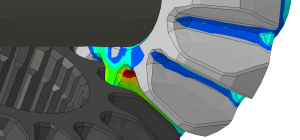19 Interesting Things About Abaqus in 2019
In 1978, Dr. David Hibbitt founded Hibbitt, Karlsson & Sorensen, Inc., and created the first version of the ABAQUS engineering simulation software. From the very start, the focus was on solving advanced problems with finite element analysis (FEA). In fact, one of the early user bases was the nuclear power industry.
That legacy of complexity and reliability continues to this day, as Abaqus (now owned by long-time HKS Inc. partner Dassault Systèmes) has become the centerpiece of the SIMULIA simulation ecosystem. A 40-year history and ever-growing feature set has made Abaqus a rich and deep topic, so here are some interesting facts about it. After you read this list, I’m sure you’ll be just as jazzed about Abaqus as we are!
Capabilities and Features
 1. While all FEA codes have their strengths, Abaqus is the leader in:
1. While all FEA codes have their strengths, Abaqus is the leader in:
- Linear and nonlinear analysis including geometric, material, and contact nonlinearities
- Material models for metals, composites, human tissue, rubber, thermoplastics, and more
- Material fracture and failure
- Robust contact capabilities and convenient setup
- High-performance computing
2. When you purchase Abaqus, you get access to Abaqus Standard, Abaqus Explicit, fe-safe (for fatigue and durability), Tosca (for shape and topology optimization), and Isight (for process automation and parametric optimization), as well as all of the Abaqus multiphysics solver capabilities, including:
- Static stress/displacement with unstable collapse and post buckling, linear elastic fatigue crack growth, and low-cycle fatigue
- Dynamic stress/displacement including implicit and explicit dynamic solvers, natural frequency extraction, and random response analysis.
- Heat transfer and thermal stress analysis
- Electromagnetic with piezoelectric analysis, coupled thermal-electrical, or fully coupled thermal-electrical-structural analysis
- Mass diffusion and coupled pore fluid flow diffusion and stress analysis
- Acoustic, shock, and coupled acoustic-structural analysis
- Fluid-structure interaction (FSI)
Abaqus provides open technology to couple with other codes, allowing for the performance of coupled multiphysics simulations between Abaqus and other codes. For a complete list of qualified partner products, see here.
3. Abaqus uses Python scripting, allowing for tremendous flexibility and customization. You can use scripts to do the following:
- Automate repetitive tasks: for example, you can create a script that executes when a user starts an Abaqus/CAE session. Such a script might be used to generate a library of standard materials. As a result, when the user enters the Property module, these materials will be available. Similarly, the script might be used to create remote queues for running analysis jobs, and these queues will be available in the Job module.
- Perform a parametric study: for example, you can create a script that incrementally modifies the geometry of a part and analyzes the resulting model. The same script can read the resulting output databases, display the results, and generate annotated hard copies from each analysis.
- Create and modify the model databases and models that are created interactively when you work with Abaqus/CAE. The Abaqus Scripting Interface is an application programming interface (API) to your model databases and models.
- Access the data in an output database: for example, you may wish to do your own postprocessing of analysis results. You can write your own data to an output database and use the Visualization module of Abaqus/CAE to view its contents.
4. Abaqus comes with a ton of documentation and example problems that are generally very well written and easy to understand. I made frequent use of Abaqus’s reference material in my analysis days.
Performance
5. New releases of Abaqus include bug fixes and performance improvements in addition to new features so you should always install the latest version, which is always available with an active lease or annual maintenance. This blog post has step-by-step Abaqus download instructions. You can have multiple versions of Abaqus installed on the same machine so you may test the latest version while continuing to use older versions. If you use 3rd party tools which interface with Abaqus, I’d recommend you test them for compatibility and upgrade those tools if needed.
 6. Abaqus can run on many different hardware platforms from something as basic as a laptop to something as sophisticated as a multi-node HPC cluster.
6. Abaqus can run on many different hardware platforms from something as basic as a laptop to something as sophisticated as a multi-node HPC cluster.
7. Abaqus computation times can be dramatically reduced with parallel processing. This can mean using more CPU cores, GPU acceleration, or even multiple machines in a network. What makes the most sense for a given budget or type of analysis can vary. A knowledgeable Abaqus reseller can help you figure it out.
8. Abaqus is available on the cloud now! Certain small or variable business scenarios can save oodles of money on hardware, utilities, IT staffing, etc. The SIMULIA cloud plans run on a credits system in order to get hardware (CPU cores and solve time on them) and software.
Simulation Ecosystem
 9. SIMULIA is the brand umbrella that includes Abaqus and other (often interoperable) CAE software that Dassault Systèmes develops:
9. SIMULIA is the brand umbrella that includes Abaqus and other (often interoperable) CAE software that Dassault Systèmes develops:
- Abaqus (for structural)
- fe-safe (for fatigue/durability)
- Tosca (for shape/topology optimization)
- Isight (for parametric optimization)
- Simpack (for multibody simulation)
- CST Studio Suite (for electromagnetics)
- wave6 (for acoustics)
- Xflow (for CFD)
10. Dassault Systèmes has other brands and brand umbrellas outside of SIMULIA, including CATIA, SOLIDWORKS, ENOVIA, GEOVIA, DELMIA, 3DVIA, NETVIBES, EXALEAD, and 3DEXPERIENCE. Many of these brands can integrate with Abaqus for their simulation capabilities — GEOVIA, for example. In total, there are more than 100 million users of Dassault Systèmes software.
11. 3DEXPERIENCE is a new platform from Dassault Systèmes that aims to unify all their brands and the users of them into a single data structure, eliminating collaborative barriers. It uses the relevant technologies of their portfolio (such as Abaqus), packaged as roles (“FE modeler”, “CFD engineer”, etc.) in a shared data space, and is available both on-premise and in-cloud.
Licensing and Purchasing
12. The Abaqus solver uses a token-based license system. In order to launch an initial analysis, Abaqus requires five tokens to run on one core and then one additional token allows for parallel processing on two cores, significantly reducing processing times. From there, additional tokens allow for additional cores, at an increasingly favorable ratio as you add more cores. Check out our token calculator and plug in some numbers!
13. Abaqus licenses are “floating”. You can put the license server on any machine you want (including your own workstation), and use the software from any machine that can reach it.
14. Abaqus and other SIMULIA products can be obtained through purchase, yearly lease, or quarterly lease. The break-even point for a list-price purchase as compared to a yearly lease is 8-9 years, but this number can come down quite a bit if promotional rates are available for your configuration.
15. Abaqus pricing is dependent upon:
- concurrent usage (pre-processing, post-processing, and/or solving)
- parallel processing
- license term duration
16. Dassault Systèmes is a forward-thinking company and often runs promotions for their most innovative products and features and for expansion into new user bases. These promotions can include cloud computing, design for manufacturing, platform/data unification, growth for existing customers, entry for new customers, and ramp-up for startup businesses.
Training and Support
 17. Dassault Systèmes uses value-added resellers (VARs) to resell the SIMULIA product line. They’re not just another step in the process — their limited client base means closer relationships, more attention, and quicker support. VARs are restricted to a (large) geographical region, and multiple regional VARs compete to earn your business. VARs are also certified bronze to platinum according to their sales success, customer satisfaction, support/staff expertise, and other metrics.
17. Dassault Systèmes uses value-added resellers (VARs) to resell the SIMULIA product line. They’re not just another step in the process — their limited client base means closer relationships, more attention, and quicker support. VARs are restricted to a (large) geographical region, and multiple regional VARs compete to earn your business. VARs are also certified bronze to platinum according to their sales success, customer satisfaction, support/staff expertise, and other metrics.
18. Dassault Systèmes offers Centers for Simulation Excellence (CSE) support & service centers across the United States. CSEs and VAR offices offer a multitude of training classes and certifications in person and online, ranging from basic classes like “Intro to Abaqus” all the way to advanced courses such as “Modeling Extreme Deformation and Fluid Flow with Abaqus”.
19. There is a constant schedule of SIMULIA training courses being conducted both online and offline, and additional courses can be requested (from either DS or your VAR). There are also self-conducted eLearning resources available to users.
With so many areas of excellence – in design, in application, and in service – Abaqus is the right choice for your engineering simulation needs. To see how it can help your business improve its products and processes, contact us today!

 Blog
Blog